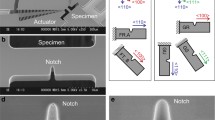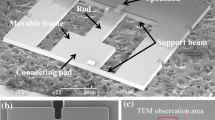Abstract
A tensile and tensile-mode-fatigue tester has been developed for testing microscale specimens in high humidity environments in order to investigate the fracture mechanisms of microelectromechanical materials. A humidity control system was installed on a tensile-mode fatigue tester equipped with an electrostatic force grip. A specimen and a griping device were inserted into a small chamber and the humidity was controlled by air flow from a temperature and humidity chamber. The humidity stability was within ±2%RH for humidities in the range 25–90%RH for eight hours of testing. Fatigue tests were performed on single-crystal silicon (SCS) specimens in constant humidity environments and laboratory air for up to 106 cycles. The gauge length, width, and thickness of the SCS specimens were 100 or 500 μm, 13.0 μm, and 3.3 μm, respectively. The average tensile strength was 3.68 GPa in laboratory air; this value decreased in high humidity environments. Fatigue failure was observed during cyclic loading at stresses lower than the average strength. A reduction in the fatigue strength was observed at high relative humidities. Different fracture origins and fracture behaviors were observed in tensile tests and fatigue tests, which indicates that the water vapor in air affects the fatigue properties of SCS specimens.











Similar content being viewed by others
References
Mutoh M, Iyoda M, Fujita et al (1990) Development of integrated semiconductor-type acceleration. Proc. of IEEE Workshop on Electronic Applications in Transportation: 35-38
Brown JA, Connally SB (1992) Slow Crack Growth in Single-Crystal Silicon. Science 256:1537–9
Tsuchiya T, Inoue A, Sakata J, Hashimoto M, Yokoyama A, Sugimoto M (1998) Fatigue Test of Single Crystal Silicon Resonator. Tech. Dig. 16th Sensor Symp. (Kawasaki): 277–80
Liu H-K, Lee BJ, Liu P-P (2007) Low cycle fatigue of single crystal silicon thin films. Sensors Actuators A 140:257–65
Tsuchiya T, Tabata O, Sakata J, Taga Y (1998) Specimen size effect on tensile strength of surface-micromachined polycrystalline silicon thin films: J Microelectromech Syst 7:106–13
Muhlstein CL, Brown SB, Ritchie RO (2001) High-cycle fatigue of single-crystal silicon thin films. J. Microelectromech. Syst. 10:593–600
Pierron ON, Muhlstein CL (2006) The critical role of environment in fatigue damage accumulation in deep-reactive ion-etched single-crystal silicon structural films. J. Microelectromech. Syst. 15:111–9
Ikehara T, Tsuchiya T (2008) High-cycle fatigue of micromachined single-crystal silicon measured using high-resolution patterned specimens. J Micromech Microeng 18:075004
Tsuchiya T, Inoue A, Sakata J (2000) Tensile testing of insulating thin films; Humidity effect on tensile strength of SiO2 films. Sens Actuators 82:286–90
Nakao S, Ando T, Shikida M, Sato K (2008) Effect of temperature on fracture toughness in a single-crystal-silicon film and transition in its fracture mode. J. Micromech. Microeng. 18:015026
Ando T, Shikida M, Sato K (2001) Tensile-mode fatigue testing of silicon films as structural materials for MEMS. Sensors Actuators A 93:70–5
Nakao S, Ando T, Shikida M, Sato K (2006) Mechanical properties of a micron-sized SCS film in a high-temperature environment. J. Micromech. Microeng. 16:715–20
Namazu T, Isono Y (2004) High-cycle fatigue damage evaluation for micro-nanoscale single crystal silicon under bending and tensile stressing. Tech. Dig. 17th Int. IEEE MEMS Conf. (Maastricht): 149–52
Muhlstein CL, Brown SB, Ritchie RO (2001) High-cycle fatigue and durability of polycrystalline silicon thin films in ambient air. Sens. Actuators A 94:177–88
Kahn H, Ballarini R, Bellante J, Heuer AH (2002) Fatigue failure in polysilicon not due to simple stress corrosion cracking. Science 298:1215–8
Tsuchiya T, Sakata J (2001) Tensile testing of thin films using electrostatic force grip. ASTM STP 1413: Mechanical Properties of Structural Films:214-28.
Goto H, Ikeda M, Sakata M, Imanaka K (1996) Development of Miniature Two-Dimensional Optical Scanner (2). Transaction of the Japan Society of Mechanical Engineers. 62:3202–9 (in Japanese)
Bagdahn J, Sharpe WN Jr (2003) Fatigue of polycrystalline silicon under long-term cyclic loading. Sensors and Actuators A 103:9–15
Acknowledgments
Part of this work was supported by the Ministry of Education, Science, Sports and Culture, Grant-in-Aid for Young Researchers, 19676002.
Author information
Authors and Affiliations
Corresponding author
Rights and permissions
About this article
Cite this article
Tsuchiya, T., Yamaji, Y., Sugano, K. et al. Tensile and Tensile-Mode Fatigue Testing of Microscale Specimens in Constant Humidity Environment. Exp Mech 50, 509–516 (2010). https://doi.org/10.1007/s11340-009-9258-1
Received:
Accepted:
Published:
Issue Date:
DOI: https://doi.org/10.1007/s11340-009-9258-1




